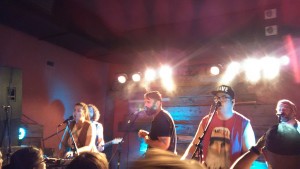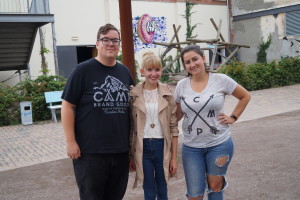„The Strumbellas are six best friends who play fun songs about dying“
Interview mit Dave und Isabel, zwei von sechs Freunden, die auszogen um Beerdigungspop zu singen
Vor dem ausverkauften Konzert der kanadischen Folkpopgruppe The Strumbellas letzte Woche im Täubchenthal sprach student!-Redakteurin Nathalie Trappe mit Violinistin Isabel Ritchie und Keyboarder Dave Ritter
student!: How do you like it here in Germany and especially in Leipzig?
Isabel: It’s our second time in Leipzig and we really like it here, it’s very beautiful. We always like being in Germany. German fans are really fun – it’s one of our favorite countries to visit.
Oh really? Have you experienced anything special with the German fans then compared with the Canadian ones or internationally seen?
Dave: When we first toured Germany I remember the crowds being very quiet, we thought that maybe they didn’t like us. Because we grew up as a band playing in loud bars with people talking, drinking, yelling and anything. So when we started playing, we thought “Oh they don’t like us, they don’t like the band”, but it turns out they were just listening, quietly and respectfully listening to the songs. So that took a little bit to get used to but now we understand that it’s like a sign of respect. And we love it now we got used to it. But at first, we thought: Oh oh, they don’t like us.
Well, we definitely do like you. So what does the perfect audience look like for you?
Isabel: Even on this tour we played in so many different kinds of places. We played a few festivals, where there are some people who know you and some of them don’t, as well as in some rowdy clubs and sit-down theatres. So I think it’s just fun to be different every night. And then you can have a different kind of show, but anytime there are fans who are happy to be there, then that’s all we need.
 And if you could play anywhere on earth where would you play?
And if you could play anywhere on earth where would you play?
Dave: If I could play anywhere right now, maybe it would be somewhere we’ve never played before, like China or South Africa. That would be very interesting. And you know, it’s always nice to play in Toronto for our hometown fans.
Where do you get the ideas for your songs from?
Dave: Our lead singer Simon usually comes up with a sort of a little nugget of an idea and then we flesh it out. So, I think he’s just writing all the time. You know, he’ll turn around in the middle of soundcheck and he’s off in the corner picking away. I think he gets his ideas just from working on songs every day. That’s why he’s so good – because he works on it all day every day.
Is he the only one to write the songs then?
Isabel: Yeah, I think he starts every song and then he sort of brings the idea to the band. After that we say if it works or not. That’s how we decide what we’re working on and what songs to finish. And usually there are parts like the bridge or the lyrics that we all come together to finish as a band.
Is there a topic you would never sing about if Simon comes up with it?
Isabel: I don’t think so. I think we’re pretty open to singing about everything as long as it’s honest and speaks true of what the band is feeling and what we’re feeling. And I think that’s why people like our lyrics – because they identify with them, because they come from the heart.
That sounds like everything is emotionally connected – which song means the most to the band and to all of you?
Dave: Um, I think it changes. We have such an intimate relationship with these songs, because we play them every night. There’s a song that I like a lot called “Hired Band” because I’m emotionally connected with it, I worked on it quite a bit in the studios, so I feel very proud of it. But it changes what songs are fun to play and what songs are meaningful to you.
What would you do if you weren’t a musician anymore, what job would you like to do?
Isabel: I sometimes think about opening a music venue, something like that would be fun. We talk about that sometimes and we just love so many things about the music industry. Whether it’s on the creative side like being a producer or an engineer or being a touring agent or a promoter. There are just so many different things you can do to be involved in the music industry even if you’re not a musician.
Dave: I started a little clothing line. It’s called Dave. It’s just a few shirts but that’s maybe what I would do if I weren’t a musician.
And if you could print one sentence on a shirt – what would it be?
Dave: Um maybe to take something from one of our songs it would be: “We’re all strange but maybe we don’t want to change.”
Speaking of role models – Beatles or The Rolling Stones?
Isabel: Beatles. We talk about the Beatles a lot in the band. We debate what the best songs are and the best record. I don’t think we ever talk about The Rolling Stones. Beatles – clear choice.
And are there plans for a new album yet?
Isabel: Yeah, we’re starting to think about new material. It’s still in the early stages but we’re demoing things out and figuring out what directions we want to go and who we want to work with. So we’re thinking about it and we’re working on it.
Last thing: Could you complete the sentence “The Strumbellas are…”?
Dave: The Strumbellas are six best friends who play fun songs about dying. (laughs)
Isabel: Like funeral pop.
Interview & Fotos: Nathalie Trappe


Hochschuljournalismus wie dieser ist teuer. Dementsprechend schwierig ist es, eine unabhängige, ehrenamtlich betriebene Zeitung am Leben zu halten. Wir brauchen also eure Unterstützung: Schon für den Preis eines veganen Gerichts in der Mensa könnt ihr unabhängigen, jungen Journalismus für Studierende, Hochschulangehörige und alle anderen Leipziger*innen auf Steady unterstützen. Wir freuen uns über jeden Euro, der dazu beiträgt, luhze erscheinen zu lassen.





